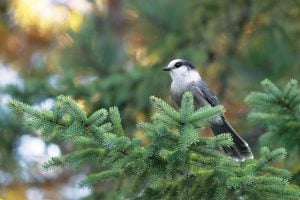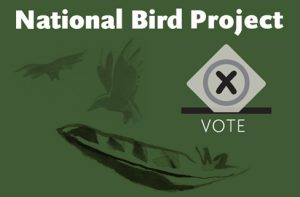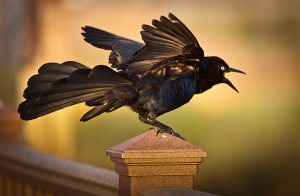
Wildlife
Excerpt from The Canada Jay as the National Bird of Canada
Editor-in-chief and associate publisher Aaron Kylie contributed this chapter to a compilation book about the Canada Jay
- 1532 words
- 7 minutes
This article is over 5 years old and may contain outdated information.
Wildlife

Canada is home to more than 450 bird species, yet somehow Canada is still one of the few nations that does not recognize a national bird. Canadian Geographic, with the help of Bird Studies Canada and other bird conservation organizations, is hoping to change that with the National Bird Project.
The essay below is an argument in favour of voting for the loon. Join the discussion on Twitter using #CanadaBird! Vote for your favourite species and contribute your own short essay today at The National Bird Project.
By: Doug Tozer, Ontario Program Scientist, Bird Studies Canada
Canadians love being outdoors. Fishing, birding, camping, hunting, backpacking, boating, canoeing, cottaging — you name it. We all crave natural areas in some form or another. It’s hard to figure out precisely why, but perhaps deep down there is something fundamentally Canadian about enjoying and conserving our vast healthy tracts of wilderness. Maybe it’s reassuring for us to see first-hand that large portions of our wonderful country are still alive and well, beyond the urban sprawl and pollution that surround many of us daily.
Canadians are diverse in the ways we choose to enjoy the outdoors, but a common thread connects us all — a symbol, which Canadians and others around the world associate with untouched wilderness, and by association, a healthy Canadian environment. That common thread is the Common Loon, now widely considered an iconic indicator of the health of aquatic ecosystems. From my perspective, there is no better bird to represent what it means to be Canadian.
Did you know that 95 per cent of the world’s Common Loons breed in Canada? The Common Loon occurs regularly in every province and territory. It even appears on our one-dollar coin, the “loonie.” The species is instantly and easily recognized by just about everyone.
Common Loons lead surprisingly mysterious and complex lives. They are fierce defenders of their territories, which can lead to violent battles between male rivals — sometimes even resulting in death. Each male’s call is unique, and his vocal characteristics convey information to other males about his weight and associated fighting ability. Another fascinating behaviour involves social gatherings numbering up to several dozen birds, where loons float around on the surface of the water and peer into each other’s eyes. Researchers have not yet determined why they do this.
The loon is readily observed as it spends most of its time floating around, often calling loudly from the middle of many of Canada’s tens of thousands of lakes. Through Bird Studies Canada’s Canadian Lakes Loon Survey, hundreds of citizen scientists each year help track the numbers of chicks that Common Loons produce as an indicator of the extent of acid rain, mercury pollution, and the associated health of our lakes, one of the most prized components of our wild spaces. Results show that loon reproductive success has declined over the past two decades, but is still high enough to support a stable population.
This well-known, intriguing species represents Canada’s globally-renowned wilderness and our love of the outdoors like no other species can. As such, it should be Canada’s national bird.
Dr. Doug Tozer is a long-time birder who grew up in the heart of Canada’s “loon country.” He is Ontario Program Scientist at Bird Studies Canada, where he coordinates the Great Lakes Marsh Monitoring Program and the Canadian Lakes Loon Survey, and oversees scientific aspects of various other programs and research projects.
Are you passionate about Canadian geography?
You can support Canadian Geographic in 3 ways:

Wildlife
Editor-in-chief and associate publisher Aaron Kylie contributed this chapter to a compilation book about the Canada Jay

Wildlife
Does a bird need to be famous to hold the title of Canada’s National Bird? Jody Allair thinks not.

Places
In Banff National Park, Alberta, as in protected areas across the country, managers find it difficult to balance the desire of people to experience wilderness with an imperative to conserve it

Travel
Spread your wings with birdwatching’s elite guard in south Texas